In recent years, Montenegro has been facing the challenge of preserving antifascist values amidst the rise of the extreme right in the wider region of the Western Balkans. This trend has been further fuelled by the participation of far-right movements in the governments of Serbia, as well as Montenegro. Additionally, there is an observable growing influence of the Serbian Orthodox Church (SOC) on the socio-political dynamics by downplaying the significance of the Peoples Liberation Movement on one hand, and by rehabilitating the collaborationist movement from the Second World War on the other.
This trend is a product of malign foreign influence from Serbia which manifests itself through disinformation and historical revisionism, and which directly contributes to the strengthening of far-right and antidemocratic forces that oppose the civic structure of Montenegro.
Serbia and the rehabilitation of the Chetnik movement
By the decision of the National Assembly of the Republic of Serbia in 2004, the Chetnik and Partisan movements were equated. The proposal came from The Serbian Renewal Movement, led by the then Minister of Foreign Affairs Vuk Drašković. By voting the proposal into law, the legalisation of the revision of the Second World War was enabled, manifesting itself through changes in street names, the installation of controversial monuments, the establishment of questionable holidays, and the alteration of history textbooks. In the coming years, elementary and high school pupils were educated in the spirit of revised history wherein Draža Mihailović, a Chetnik commandant, was portrayed as an antifacist fighter and opponent of the occupying forces. Moreover, with the Rehabilitation Law of 2006, the road was paved for the societal establishment of the construct, thus transforming the collaborators of the fascist occupier into fighters for Serbian national interests.
Since the adoption of the aforementioned law in Serbia, more than 3.000 people have been rehabilitated, and the state has paid out more than 272 million Dinars in compensation. Among them are 200-300 members of the notorious SS division Prinz Eugen, known for committing major crimes. It is precisely on the basis of that law that Draža Milailović was rehabilitated in May 2015. The decree of the Higher Court states: After debating and voting, this court has reached a decision. The request for the rehabilitation of Dragoljub Mihailović Draža is accepted. As of today, he is considered not to have been convicted. Recently, a museum in Belgrade dedicated to Draža Mihailović was opened.
In May 2023, the Court of Appeals in Belgrade confirmed the decision of the Higher Court of Valjevo, which approved the request for the rehabilitation of Nikola Kalabić, the former commandant of the Mountain Guard of the Yugoslavian Amry in the Homeland.
The media largely contributes to the revisionist campaign, as well as social media platforms that are becoming crucial for the activities of far-right and fascist organisations. Their numbers and presence are steadily increasing in the socio-political life of Serbia.
An attack on antifascism in Montenegro
For decades Montenegro has been a positive example of cultivating antifascist values in the region, even though the government of the time, led by the Democratic Party of Socialists, did not pay particular attention to this issue. Unlike those in Serbia, the state institutions of Montenegro have had a clear stance towards quisling movements during the Second World War. On the other hand, the pro-Serbian political organisations unequivocally carried out historical revisionism, portraying the criminal Chetnik movement as antifascist.
After the change of government in August 2020, there have been frequent attempts of rehabilitation and promotion of the Chetnik movement, tolerated by the current government on both a local and state level, mostly with the involvement of the clergy of the Serbian Orthodox Church. This religious institution which, according to public opinion research enjoys the highest level of trust among citizens, including the youth, significantly influences the political landscape in the country. The influence of the Serbian Orthodox Church was evident during the parliamentary elections of 2020, during the formation of the 42nd government of Montenegro (Which the SOC directly nominated), and during the signing of the Fundamental agreement.
The SOC often marginalises the Partisan movement and the national heroes of the Second World War, placing them in a negative context. It simultaneously organises memorial services in honour of Draža Mihailović, redefining historical facts and positioning the Chetnik movement as a part of the antifascist one. In August 2020, the bishop of Budimlja-Nikšić, Metodije Ostojić, praised Draža Mihailović and Pavle Đurišić, Chentik leaders of the Second World War responsible for war crimes and mass killings of civilians. During the memorial service in Gorje Zaostre, which preceded the traditional Chetnik gathering, Bishop Metodije labelled Mihaliović and other Chetnik leaders as commandants who fought for the right cause. The memorial service held at the Cathedral Church in Nikšić this year was attended by the President of the Municipality Marko Kovačević from New Serb Democracy (NSD) and the President of the Local Parliament Nemanja Vuković from Democratic Montenegro.
One of the foremost representatives of the SOC in Montenegro, the priest Gojko Perović, perceives the Chetnik leader and his followers as anti-fascist freedom fighters in his authored text, citing the verdict of the Higer court in Belgrade from 2015. The text of the former rector of the Cetinje Seminary was disseminated by the most widely read and influential media in the country.
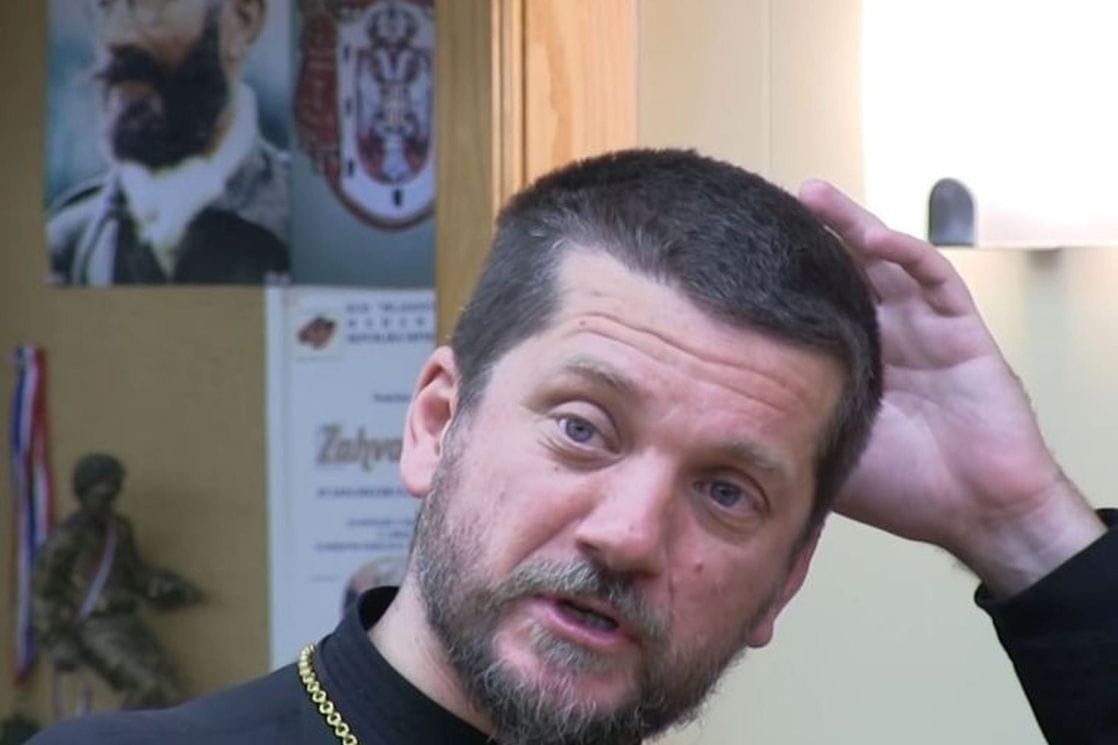
During the gatherings organised by the SOC in front of the Cathedral of Christ’s Ressurection in Podgorica, a black Chetnik flag inscribed with the text with faith in God, for the king and the homeland was prominently displayed. This religious organisation offers ideological guidance to pro-Serb organisations, including political parties, cultural associations, and media.
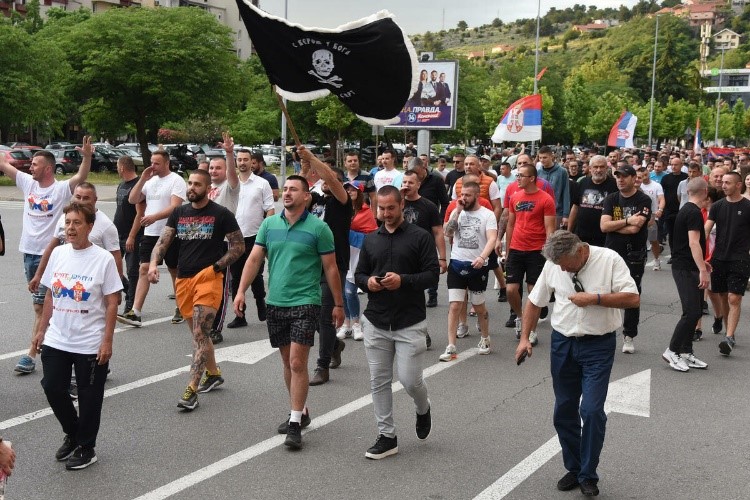
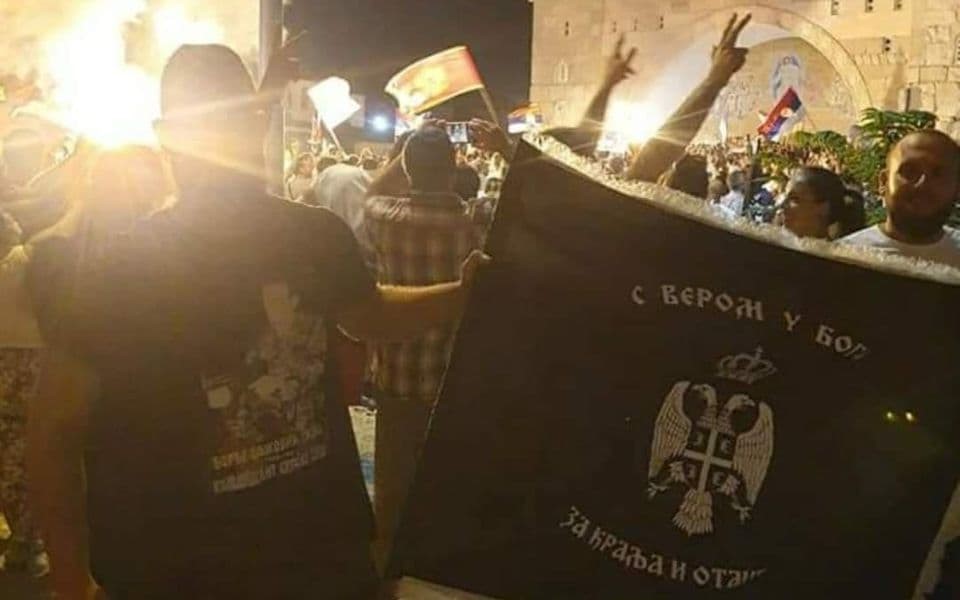
Some of the highest representatives from the so-called “August 30th majority” openly support war criminals and hold highly controversial opinions about the past and movements which were fundamentally collaborationist, with a tendency of ideologically rewriting history and attempting to equate the Chetnik and Partisan movements.
New Serb Democracy especially stands out as a political party that glorifies the Chetnik movement. Andrija Mandić, the leader of the party, holds the title of Chetnik Duke, according to some media reports.
Within the Montenegrin parliament, this party formed the new majority and, in accordance with the coalition agreement for the formation of the 44th government of Milojko Spajić, Mandić was elected as the President of the Parliament of Montenegro. The president of the Municipality of Nikšić Marko Kovačević, and MP Jovan Jole Vučurović, both NSD officials, also stand out for their revisionist views.
The recent case of undermining the antifascist heritage in Montenegro involves the change of the Municipality Day of Pljevlja. In September 2023, the ruling coalition decided to change the Municipality Day of the city of Pljevlja from November 20th (the day when the town was liberated from the occupiers in 1944) to the day of the orthodox religious holiday Saint Paraskeva of the Balkans. The initiative was submitted by the councilmen from the former Democratic Front: New Serb Democracy and Democratic People’s Party, supported by Aleksa Bečić’s Democrats. MPs from the Europe Now Movement, who also constitute the ruling majority in the town, did not attend the voting. The initiative and decision were preceded by a campaign by the Bishop of the Serbian Orthodox Church Atanasije, who advocated that the MPs should raise their hands for the liberation from the remainder of the godless communist heritage, embodied within the previous Municipality Day. In an official statement after the proposal was passed, Atanasije claimed that the MPs in Pljevlja wrote their name in the notebooks of Serbian history.
In addition to the SOC and political parties, extreme right-wing groups, particularly Orthodox brotherhoods operating under its guise, contribute to the attack on antifascist values. The Ministry of Internal Affairs of Montenegro banned the Serb nationalist “Ravnogorski pokret” organisation in 2016, but the ban has seemingly had no effect, as it still appears in the registry of non-governmental organisations. Its activities were not suspended, as it was evident after the elections in August 2020. Orthodox brotherhoods such as “Stupovi” and “Zavjetnici Tvrdoš”, whose members do not hide the fact that they are sympathisers of the Chetnik cause, also stand out.
In Montenegro, during October and November 2023, the propaganda film “Heroes of Halyard” by Serbian director Radoš Bajić was shown, despite earlier information that the screening would be cancelled. The film, which glorifies the Chetnik movement, was distributed throughout the country. Its screening was particularly controversial at the Cultural Centre in Kotor, named after Nikola Đurkovič, a fighter of the Peoples Liberation Movement whom the Chetniks killed. It is yet another example of how revisionist narratives infiltrate the cultural and societal spheres.
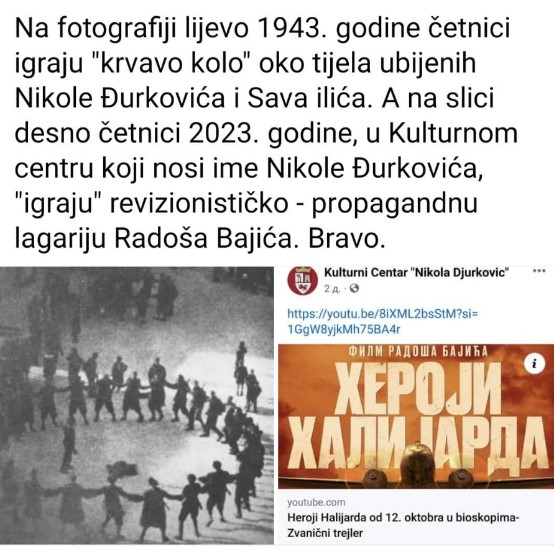
The future of antifascism in Montenegro
Montenegro has had over 30 thousand uprisings, and in relation to its population, it has given the largest number of national heroes in the Second World War among all the countries of the former Yugoslavia, a total of 257. Their heroism and sacrifice are constantly belittled today.
It is evident that the campaign which was successfully conducted in Serbia, aimed at rehabilitating the Chetnik movement, has now spilled over into Montenegro. The Serbian Orthodox Church, in synergy with political parties, the media, and far-right groups, is deleting the boundaries between victors and losers in the Second World War. At the same time, its goal is the revival of the idea of creating ethnically pure states, advocated by the Chetniks. Pljevlja are thus a striking example, as it is a multinational and multireligious community, where this year’s Municipal Day will be celebrated on an Orthodox religious holiday.
The results of the research conducted by the Centre for Civic Education have shown that only a third (32.3%) of the citizens of Montenegro feel closer to the Partisan movement. For less than a fifth of the respondents (18%) it is the Chetnik movement, while almost half of those surveyed cannot decide on the issue (49.7%). The research further shows that in the new government, when observed based on party affiliation, there is a noticeable dominance of entities closer to the Chetnik movement (FFM – 60%, SPP – 48%, EUM – 27%, DM – 27%). Moreover, it should be stated that more than half of the supporters of EUM and DM are undecided on the issue. Practice has also shown that EUM and DM either support or tolerate the promotion of the Chetnik movement in Montenegrin society.
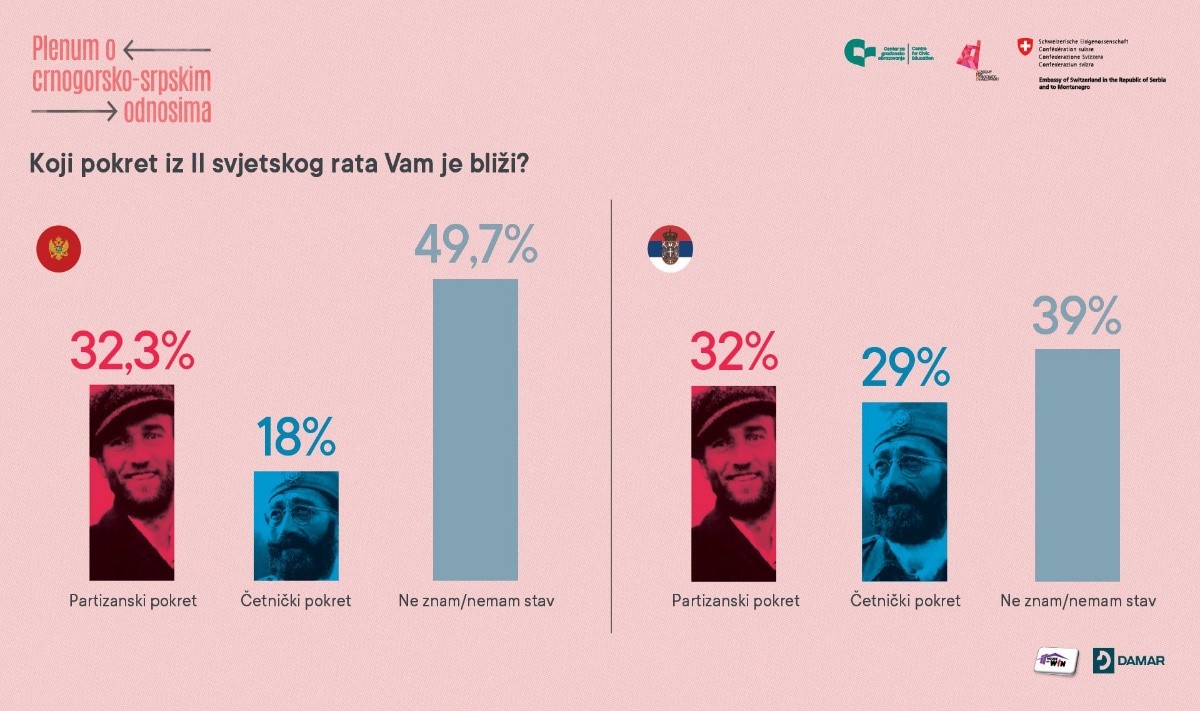
It is noticeable that the proponents of the Chetnik ideology particularly focus on culture and education. Thus in the 42nd government of Montenegro, Prime Minister Zdravko Krivokapić appointed Vesna Bratić as the Minister of Education, Science, Culture, and Sports. Later, in June 2021, the Parliament voted for Bećir Vuković as the president of the jury of the “July 13th” award. Besides being famous as a promoter of the Chetnik movement, he is also a known denier of the Montenegrin identity, language, and nation. Former Democratic Front MP Budimir Aleksić, one of the initiators involved in erecting a monument to Chetnik commander Pavle Đurišić, was nominated as a diplomatic-consular representative in Sarajevo during Minister Đorđe Radulović’s term at the Ministry of Foreign Affairs. The then-president Milo Đukanović refused to verify and sign the appointment decree.
The coalition agreement for the formation of the 44th Government of Montenegro envisioned the entry of “For the Future of Montenegro” (which consists of NSD and DPP) into the Government, one year after the formation. It is noteworthy that the education sector will fall into the hands of this coalition.
At the same time, the SOC is establishing private religious schools in Montenegro, supported with 900 thousand euros allocated by the previous interim government, despite procedural violations in licencing and funding. Additionally, its leaders are constantly highlighting the need to introduce religious education in public schools. The Fundamental Agreement, signed by the former interim Prime Minister Dritan Abazović, leaves room for this initiative.
It is evident that the trend of historical revisionism challenging Montenegro’s antifascist and civic values is set to continue, despite numerous pieces of evidence of mass atrocities, and collaboration of the Chetnik movement with the occupiers. Additionally, supporting such regressive ideologies not only contradicts civic values but also the fundamental principles upon which Montenegro’s heterogeneous society rests. However, the significant number of individuals hesitant in choosing between the fascist and collaborationist movements on one hand, and the anti-fascist People’s Liberation Movement on the other, is alarming, because it additionally highlights the success of the revisionist campaign in Montenegro.

